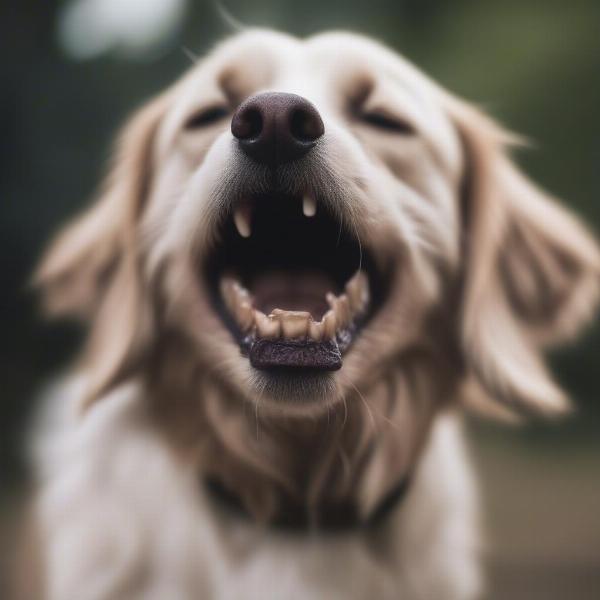Dog breeds with an underbite, also known as a prognathism, possess a distinct facial structure where the lower jaw protrudes slightly beyond the upper jaw. This unique trait, often associated with certain breeds, can add to their charm and contribute to their overall endearing appearance. While a moderate underbite is generally harmless, it’s important to understand the potential health implications and choose a reputable breeder who prioritizes the well-being of their dogs. This guide explores various dog breeds with an underbite, highlighting their characteristics and addressing common concerns surrounding this unique facial feature.
Understanding the Underbite in Dogs
An underbite is a fairly common malocclusion, or misalignment of the teeth, in dogs. It occurs when the lower jaw and teeth extend further forward than the upper jaw and teeth. While a slight underbite can be considered a breed standard for some dogs, a severe underbite can cause dental problems and difficulties eating.
What causes an underbite? Genetics play a major role. Certain breeds are predisposed to developing this trait. However, environmental factors, such as trauma to the jaw during puppyhood, can also contribute.
Popular Dog Breeds Known for Their Underbite
Several breeds are recognized for their characteristic underbite. Some of the most common include:
- English Bulldog: Perhaps the most iconic breed with an underbite, the English Bulldog’s pushed-in face and prominent lower jaw are defining features.
- French Bulldog: Like their English cousins, French Bulldogs are known for their brachycephalic (short-nosed) features and often have a moderate underbite.
- Boston Terrier: These lively little dogs often sport a slight underbite, contributing to their expressive faces.
- Boxer: Boxers, known for their playful and energetic nature, often exhibit a slight to moderate underbite.
- Pug: These wrinkly companions often have a slightly undershot jaw, adding to their distinctive appearance.
Is an Underbite in Dogs a Problem?
A slight underbite in breeds where it’s considered a standard is generally not a cause for concern. However, a severe underbite can lead to a variety of issues, including:
- Difficulty Eating: A significant underbite can make it difficult for a dog to pick up food and chew properly.
- Dental Problems: Misaligned teeth can lead to increased plaque buildup, gum disease, and tooth decay.
- Jaw Pain: In some cases, a severe underbite can cause pain and discomfort in the jaw joint.
- Injury to the Soft Tissues: The lower teeth can sometimes rub against the roof of the mouth, causing sores and irritation.
 Dog Underbite Health Concerns
Dog Underbite Health Concerns
Choosing a Breeder for an Underbite Breed
If you’re considering a breed known for its underbite, it’s crucial to choose a reputable breeder. A responsible breeder will prioritize the health and well-being of their dogs and ensure that the underbite is not so severe that it causes problems. They will also be knowledgeable about the breed standard and be able to answer any questions you have about the underbite. Ask to see the parents of the puppies to get an idea of the typical underbite in the breeder’s lines.
Caring for a Dog with an Underbite
Caring for a dog with an underbite may require some special considerations:
- Regular Dental Care: Brush your dog’s teeth regularly to prevent plaque buildup and gum disease.
- Monitor for Dental Issues: Watch for signs of dental problems, such as bad breath, excessive drooling, or difficulty eating.
- Veterinary Checkups: Regular veterinary checkups are essential to monitor the underbite and address any potential issues.
- Diet Adjustments: In some cases, dogs with severe underbites may require a special diet or feeding methods.
Conclusion
Dog breeds with underbites possess a unique charm that many find endearing. While a moderate underbite is often harmless and even considered a breed standard in some cases, it’s important to understand the potential health implications. By choosing a responsible breeder and providing proper care, you can ensure that your underbite dog lives a happy and healthy life. Remember to consult with your veterinarian if you have any concerns about your dog’s underbite.
FAQ
- What is the technical term for an underbite in dogs? The technical term is prognathism.
- Can an underbite be corrected in dogs? In some cases, especially in puppies, orthodontic treatment may be possible. However, for adult dogs, surgery might be the only option for severe cases.
- Are all underbites the same? No, underbites range in severity from slight to severe.
- Do all Bulldogs have underbites? While underbites are common in Bulldogs, not all Bulldogs will have a pronounced underbite.
- Can an underbite affect a dog’s lifespan? A slight underbite typically doesn’t affect a dog’s lifespan. However, a severe underbite can lead to health problems that could potentially shorten their lifespan if left untreated.
- How do I choose a reputable breeder? Look for breeders who prioritize health testing, provide proper socialization for puppies, and are knowledgeable about the breed.
- Is it cruel to breed dogs with underbites? If the underbite is moderate and doesn’t cause the dog any health problems, it’s not considered cruel. However, breeding dogs with severe underbites that cause significant issues is unethical.
ILM Dog is a leading online resource dedicated to providing dog owners with reliable and practical information on all aspects of dog care. From breed selection and health to training and nutrition, we offer expert advice to help you provide the best possible care for your canine companion. We also offer a wide selection of dog breeds with underbites and dog breeds with an underbite for your reference. For more information on breeds of dogs with underbites, explore our comprehensive guides. Whether you’re looking for the perfect dog coffee mug or premium tux dog food, ILM Dog is your one-stop shop for all your dog-related needs. Contact us at [email protected] or +44 20-3965-8624.